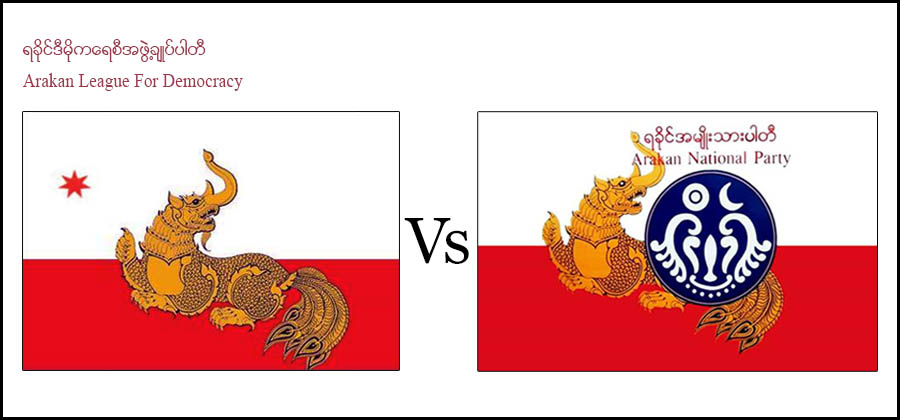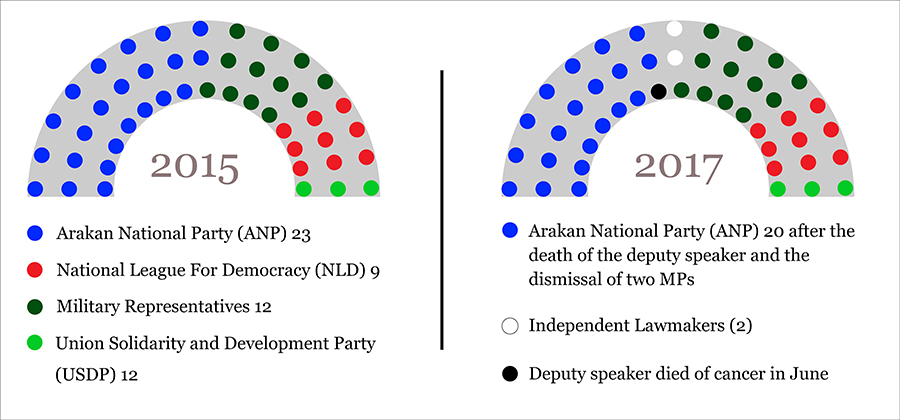YANGON – In early 2016, the Arakan National Party (ANP) expelled six senior members for opposing its party nominee for Rakhine State’s chief minister, but the dust seemed to have settled until the deputy speaker U Phoe Min died of gastric cancer on June 17.
The vacant position looked destined to be filled by the ANP—which won 23 of the 47 state parliament seats—but by exactly whom became the source of tense competition, resulting in party rifts and the dismissal of the victor.
Surprise Candidate
On July 13, the ANP steering committee listed criteria for possible candidates: a central executive committee (CEC) member with a “reasonable” level of education who was faithful to the party and would follow its policies.
Eventually, the contest dwindled from four hopefuls to the winner, U Aung Win of Myebon Township, who stood against the National League for Democracy (NLD) candidate U Boe Nwe of Munaung Township and, unexpectedly, ANP lawmaker U Mya Than.
U Mya Than told The Irrawaddy over the phone that independent regional minister for agriculture and livestock U Kyaw Lwin recommended him on the basis of his legal acumen and experience. He served as a director in the attorney general’s office for decades before entering politics, and currently assists the state House Speaker U Kyaw Zan Hla on legal matters. Four lawmakers told The Irrawaddy they felt he was the most appropriate person for the position.
But U Mya Than was barred from contesting on behalf of his own party as he is not a CEC member. Regional minister U Kyaw Lwin surprised parliamentarians, too, as he endorsed a candidate from the party that fired him in early 2016, when he accepted the role of regional minister from the NLD. The sacking was reportedly in response to the NLD refusing to appoint an ANP member as chief minister.
U Mya Than told The Irrawaddy every lawmaker has the right to compete for a seat, adding that his party did not directly tell MPs to avoid the contest. With those convictions, he ran for deputy speaker.
Cracks Appear Between Lawmakers
Before July 17, the Rakhine parliament was comprised of nine NLD seats, three Union Solidarity and Development Party (USDP) seats, one independent seat, 12 seats reserved for the military, and 21 ANP seats—down from 23 after the death of Phoe Min and the dismissal of U Kyaw Lwin. Naturally, the presumption was that U Mya Than would vote for himself.
On July 14, 45 votes were cast, with one legislator on leave, according to lawmakers. In a result that astounded many in the parliament, U Mya Than won with 19 votes, while ANP nominee U Aung Win got 17, NLD nominee U Boe Nwe got six, and three were invalid—a deliberate act of abstention, according to several lawmakers.
ANP secretary U Tun Aung Kyaw supposed some ANP legislators voted for U Mya Than.
“It would not have happened if U Mya Than stepped aside from the contest,” he said. “We are now facing strong criticism from people saying we are a party of disharmony… such a result is quite embarrassing.”
U Tun Aung Kyaw conceded that some ballots from the USDP and NLD also favored U Mya Than. He considered that U Mya Than, whose son is a captain in the military, may have attracted votes from the entire bloc of army representatives.
Regional minister U Kyaw Lwin said some ANP lawmakers told him to nominate U Mya Than, who got four USDP and NLD votes, six from the military representatives, and nine ANP votes, according to a Facebook post from the minister. Sources inside the parliament supported the claim that ANP legislators voted against their party’s candidate.
“Other candidates also got army representatives’ secret votes. I don’t want to write this down on Facebook,” said U Kyaw Lwin.
Dismissal and Resignation
The ANP expelled U Mya Than on July 17, accusing him of violating party regulations and disrupting party unity, said U Tun Aung Kyaw. But the dismissal stirred arguments among the 30 CEC members, including 13 Union lawmakers in Naypyitaw.
Lower House ANP legislator U Pe Than of Myebon Township vented his disagreement with the dismissal on Facebook. Banishing U Mya Than, he wrote, was not in line with party principles, and chastised the party board for executing the decision without seeking the advice of its Union lawmakers. He said the party could have penalized U Mya Than in accordance with its code.
“If similar cases happen in the future, it could be lead to a big problem,” he said.
Adding to the turmoil, Upper House ANP lawmaker Daw Htoot May posted her resignation letter on Facebook on July 24, admitting she had become unsatisfied with ANP policies.
She has since joined the Arakan League for Democracy (ALD), a party that disbanded before the 2015 election to help form the ANP and now aims to battle against it in the 2020 election.
Observers from the Rakhine community, including Thailand-based political analyst U Wong Aung are predicting that the ANP will have problems in the 2020 general election if it cannot resolve its current infighting.
“Driving out party members based on emotion is deeply concerning,” said U Wong Aung.
With the election in mind, the Union Election Commission (UEC) officially recognized the ALD as a political party on July 18. The ANP argued to the UEC that the ALD flag and logo were too similar to their own and could confuse voters, but their objection was rejected.

Return of the ALD
The ALD and Rakhine Nationalities Development Party (RNDP) merged into the ANP in order to prevent vote splitting in the 2015 election—a gambit that paid off, as it won 45 out of 77 seats it contested. But the new incarnation strained after the formation of its CEC.
To the chagrin of some of its members, the ANP released a statement in January 2016 refusing to “join any government organization” but to “stand as an opposition party for the interests of Arakan people” after the NLD chose one of its own for the state minister post. Six former ALD members were then expelled for holding a press conference protesting the announcement.
Soon after, the ANP released a second statement warning that any of its MPs-elect who accepted an offer from another party to serve in a ministerial post or other leadership position without informing the party would be expelled.
In September 2016, former ALD members announced they were leaving the ANP and the merger dissolved.
Prominent ALD member U Myo Kyaw said the purpose of his party’s reemergence is to restore the pride of the Arakanese within the region and before the international community because, he said, the current actions of the ANP are shaping the Arakanese people into a villain on the international stage.
“We just want to prevent Rakhine from going into the wrong political direction,” he said. “For example, there were a lot of protests instead of seeking options to solve the problems [in the state]. Eventually, the international community thought of us as barbaric.”
U Myo Kyaw explained that his party is focused on achieving a democratic federal Union, regional stability, security in border affairs, collaboration with the NLD, resource sharing with the Union government, and gaining a “reasonable” percentage of youth representatives in the executive committee of the party.
“We are rich in resources and sell exports everyday but we have no idea how much income we get daily,” said U Myo Kyaw, referring to the Union government’s control of the regional budget.

‘Tougher Than 2015’
The ANP will not repeat its 2015 electoral success in 2020, especially in southern Rakhine, according to Kyaukphyu Rural Development Association (KRDA)’s coordinator U Tun Kyi.
The ALD has a strong foothold in the southern townships of Myebon and Ramree, he said, and its headquarters is based in the northern township of Kyauktaw. Other seats such as Thandwe, Taungup and Gwa are strong constituencies of the NLD, he added.
U Myo Kyaw said it was premature to reveal his party’s strategy, but he did suggest it would target its strongest areas.
ANP lawmaker U Pe Than forecasted vote splitting for the 2020 election, expressing concerns that even the NLD could possibly steal some seats in prominent ANP constituencies.
But U Tun Aung Kyaw, the ANP secretary, was confident for his party, saying that as an established party, it would echo the NLD’s robust performance in 2015, when it won many Union and regional seats.
“The 2020 election will be a tug of war between maturity and political enthusiasm,” said U Wong Aung. His statement reflects a common battle among Arakanese voters between that of nationalism against a more flexible, liberal approach.
KRDA coordinator U Tun Kyi said the young, educated Arakanese of today would see how the “opposing policies” of the ANP would turn out over the decade. He added that many voters do not comprehend ANP’s policies but balloted for the party on nationalist sentiments.
“ANP can win, but it will be tougher than the 2015 election in the southern constituencies,” he said.
U Wong Aung believes the ANP should make reforms during the coming party conference, including the development of precise policies and the involvement of the younger generation in leadership roles. He added that if the party “drags its feet,” it would face “greater challenges.”

















